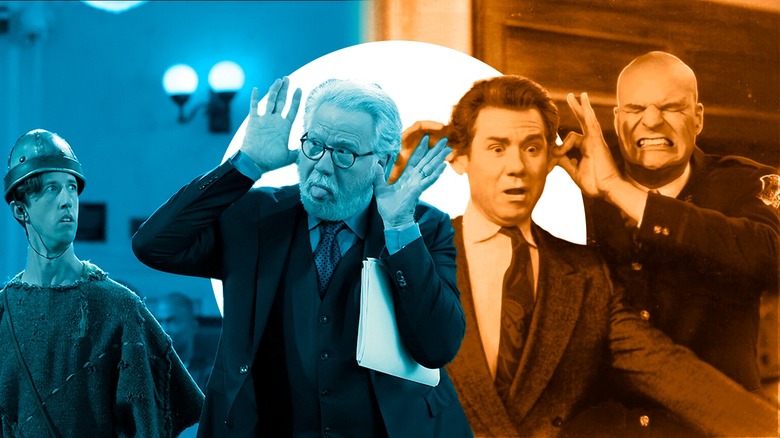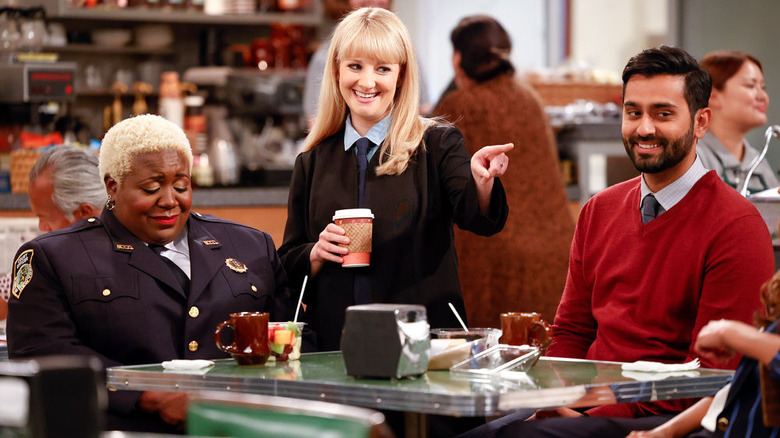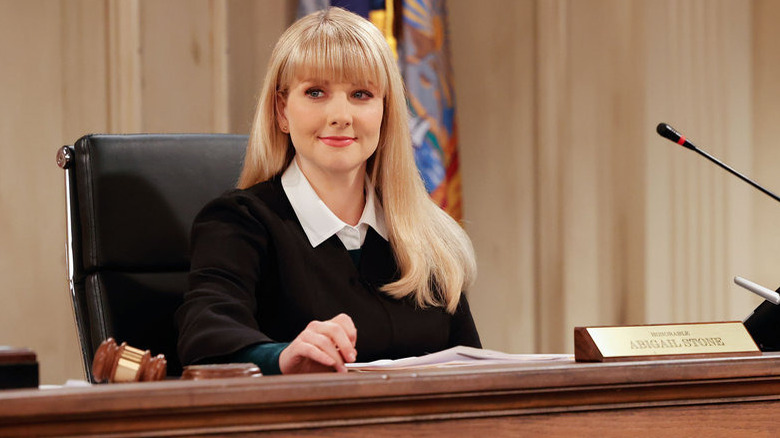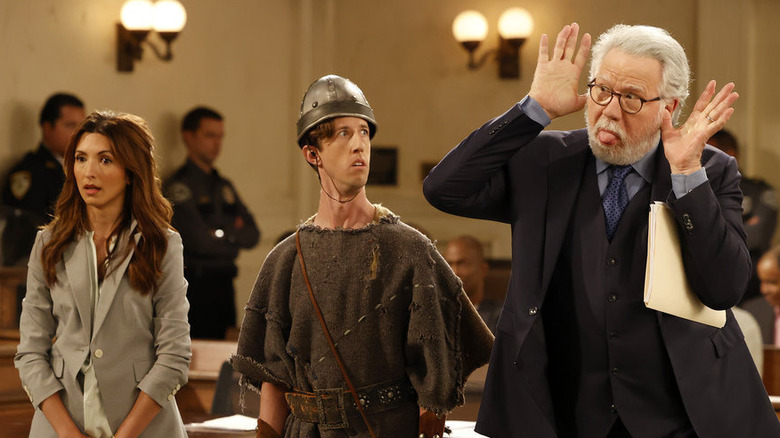Night Court Is The Sitcom Reboot That Lays Down The Law On All The Others (& It's All Thanks To The Original)
The runaway success of "Night Court" has proven one major truth: it's absolutely possible to go home again.
It's a home that's got great bones, crafted by architects who know how to build a compelling world, and added onto by caring fans of the original property. And yet the beauty of this new take, following the antics of a group of legal types handling the overnight processing of criminals in the city that never sleeps, is its ability to surround something nostalgic with something wholly fresh. Abby Stone (Melissa Rauch) is perkier than her father was, but she carries baggage heavier than his. She shares her father's love of justice, kindness, and mischief, but she's anxious, overstressed and dealing with a long-distance relationship. She's not a carbon copy of her father but could easily fit into the first show's world.
Even if most of the folks who once lived and loved at Manhattan Criminal Court are long gone, and only one main character — the ever-great Dan Fielding (John Larroquette) — still remains from the first show to anchor the new with a sense of familiarity, this neophyte "Night Court" does one thing perfectly — it feels like "Night Court." It rolls the old up into the new like a delicious Thanksgiving weekend burrito, its freshness complimented by nostalgia.
That's just one of the reasons why "Night Court" is far superior to the thick phalanx of late-2010s and early 2020s comfort food-style requel media which has inundated movie screens and televisions worldwide. It definitely rules the sitcom courtroom with its effortlessly ability to make audiences care — and that's all thanks to its firm rooting in the original's ability to smile with a tear in its eye.
Night Court knows its roots but isn't afraid of growth
Revival series sometimes stumble when they try to recapture the magic that made a show wonderful. Prime example: NBC's "Will & Grace." It went to the trouble of undoing its central characters' various happy endings to mire them back into each other's orbits and apartments, but had nothing new or interesting to say about life as a singleton of a certain age. Denying Grace Adler (Debra Messing) the ability to grow and change, only to mire her back in an unplanned pregnancy just like the one that closed out the show's original run, highlights the lack of purpose inherent in the show's three revival seasons.
"Night Court" avoids this sort of pitfall by refusing to turn back the clock on its characters, allowing the old ones to grow, and letting the new characters be complex. Even though Harry Stone (and, tragically, the man who played him) died before this revival began, the new show's backstory reveals that the judge became a happy father in a stable marriage before his passing, thereby defying his unusual family background. Even more importantly, it's revealed that the older Dan Fielding shed his womanizing ways for a stable, fruitful and long-lived marriage with his now-deceased wife. Both characters continued to grow and change as people off-screen, instead of being stuck in a never-ending cycle of doing and repeating the same actions as time goes on. Even Abby — grappling with a long-distance relationship, dealing with her alcoholism, and trying to figure out how to be a good judge — does not remain in stasis during the show's first season. That's the kind of development "Night Court" creator Reinhold Weege would be proud of.
Night Court's plots have both drama and humor
The original "Night Court" knew how to combine drama and comedy in a single package without making its audience yawn. For example, the original "Night Court" finale featured one of the show's characters experiencing a gravely serious medical emergency right alongside a wacky subplot where a character was abducted by aliens. The classic "Night Court" also featured two regular characters who experienced the ups (and downs) of immigrating to America in the 1980s — and a bum who acted as Dan's lackey, only for everyone to find out he was wealthy after he was crushed by a piano. The show's one-off episodes could vary wildly between delivering messages about the dangers of media obsession and taking the whole show's cast to the morgue when a fire breaks out at the courthouse. In short: Harry Stone's courtroom was a vehicle for true love, silly court cases, and dangers. It ran the gamut of emotions, and without faltering.
This new version of "Night Court" seems to be following in a similar direction, balancing Dan's attempt at dipping his toes back into the dating pool with a subplot featuring Abby being called to mediate arguments while being stuck on the subway. Dan's loneliness and Abby's status as a recovering alcoholic are serious topics that the show treats with gravity. It draws from real-life issues such as student protests, much like the original show.
Compare and contrast at will with the Hulu-exclusive fourth season of "Veronica Mars," which ended with the death of Logan Echolls (Jason Dohring) in a bombing intended for our titular heroine (Kristen Bell). This resulted in Veronica's entire outlook changing and the show failing to match the spirit and tone of its origin point.
Careful shepherding by Melissa Rauch means a better experience for everyone
Another key to the success of "Night Court" is that it's been brought back to the small screen by fans of the first show. Melissa Rauch (who co-produces the reboot series as well as starring in it) has gone on the record multiple times to prove herself as a big fan of the first series. She told Salon in February 2023 that they went the extra step of being certain that the show would go on before a live studio audience, just like the original did. In a world where single-cam comedies had begun to dominate the sitcom landscape, that's a bold move that ended up paying off in a huge way for NBC, and may even result in networks pivoting back toward producing multi-cam sitcoms again (or at least thinking about it). It's Rauch's attention to detail as a producer and actor that links the two shows together and manages to create a cohesive narrative that makes it second to none when it comes to continuation.
Unlike, for example, the "90210" reboot. While the show ran for five seasons on The CW and included characters who knew and were relatives of "Beverly Hills 90210," the show's producers neglected to make these updated versions of Kelly Taylor (Jennie Garth), Dylan McKay (Luke Perry) and other recurring characters fall in line with their original Fox-based counterparts. This creates dissonance between the two shows and fails to create a fully cohesive multi-series experience.
Here's what future series revivals can learn from Night Court
So what can future sequel series learn from "Night Court," exactly? For one, that it's not always necessary to have more than one member of the originating show's main cast to create a series worth watching. But more importantly, if you're going to include characters from previous iterations of the show, letting them be the same character — but also, letting them grow up, age, and mature — is a great idea. Building on what you have is also a good notion, but don't be afraid to try new things. If your show feels like the show that spawned it, audiences will likely follow you anywhere, and you might even pick up some new people, as "Night Court" has done. They have created a cohesive unit that hangs beautifully together, and that should be the aim of every reuniting cast.
Hopefully the birth of "Night Court" means there will be plenty of wonderful sitcom continuations to come in the future.




